An Analysis of the Evolution and Tenets of Green Politics
VerifiedAdded on 2023/06/03
|9
|2170
|439
Essay
AI Summary
This essay provides a comprehensive overview of Green Politics, tracing its evolution and outlining its core tenets. The introduction defines Green Politics as a political ideology centered on ecological sustainability, grassroots democracy, social justice, and non-violence, originating in the 1970s and encompassing various green parties globally. The essay emphasizes the four key pillars of Green Politics: ecological wisdom, grassroots democracy, non-violence, and social justice. It delves into the economic aspects, highlighting Green economics' distrust of conventional capitalism and its emphasis on long-term goals, sustainability, and the importance of environmental well-being. The essay also explores participatory democracy, emphasizing citizen involvement in decision-making and the importance of local-level action. Finally, the essay touches upon other issues addressed by Green Politics, such as the decriminalization of certain offenses, non-violence, and the opposition to nuclear fusion and genetically modified organisms, concluding with a call to embrace Green Politics to address global warming and environmental degradation.
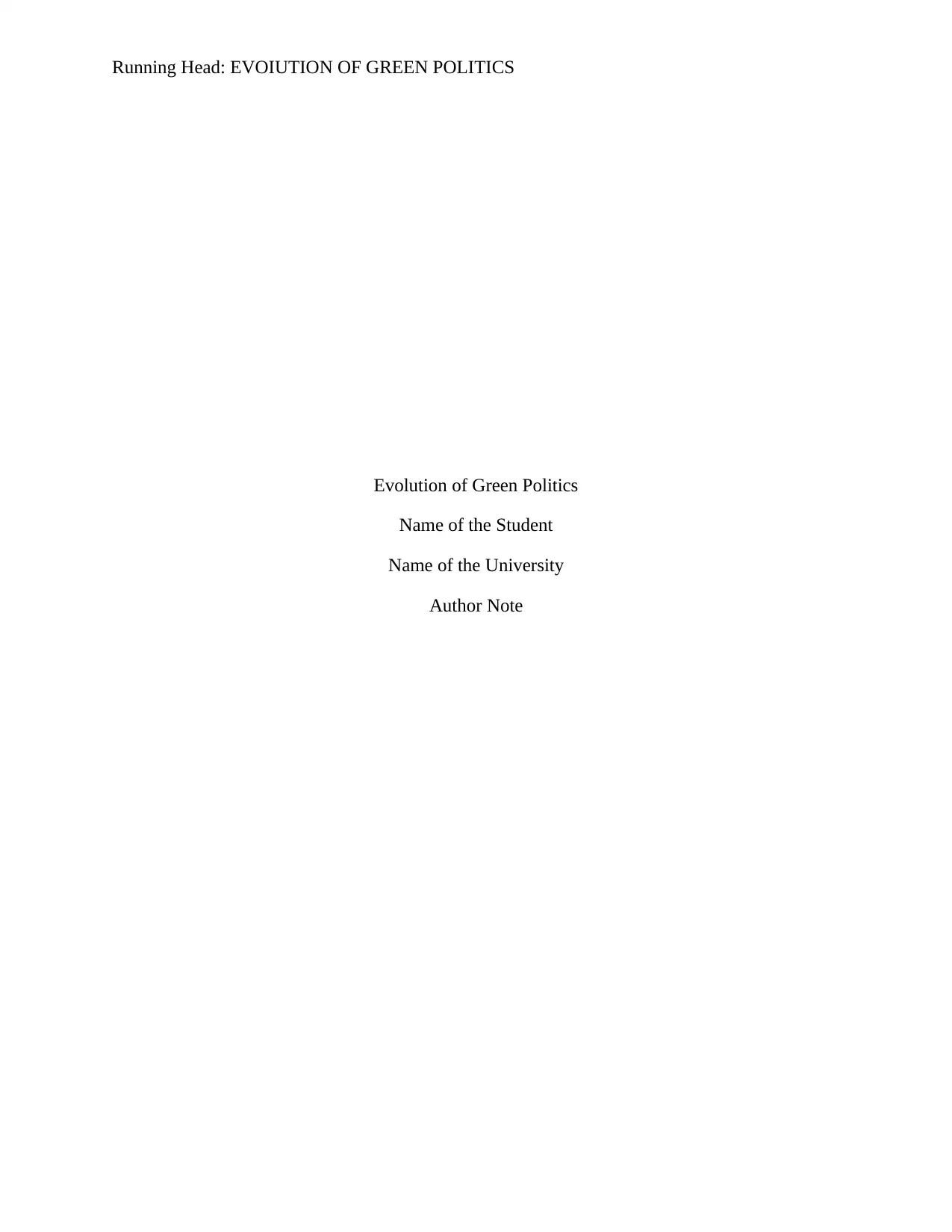
Running Head: EVOIUTION OF GREEN POLITICS
Evolution of Green Politics
Name of the Student
Name of the University
Author Note
Evolution of Green Politics
Name of the Student
Name of the University
Author Note
Paraphrase This Document
Need a fresh take? Get an instant paraphrase of this document with our AI Paraphraser
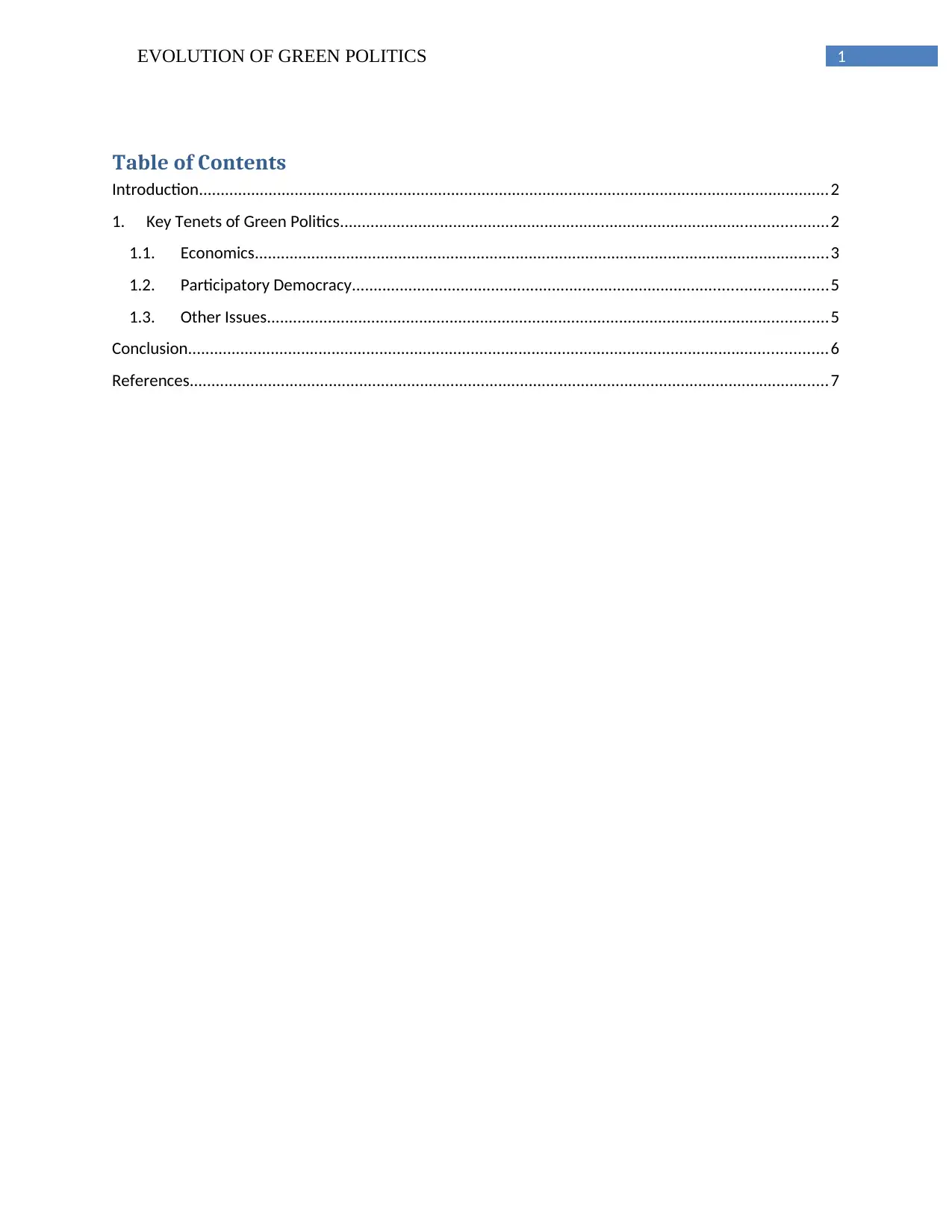
1EVOLUTION OF GREEN POLITICS
Table of Contents
Introduction.................................................................................................................................................2
1. Key Tenets of Green Politics................................................................................................................2
1.1. Economics....................................................................................................................................3
1.2. Participatory Democracy.............................................................................................................5
1.3. Other Issues.................................................................................................................................5
Conclusion...................................................................................................................................................6
References...................................................................................................................................................7
Table of Contents
Introduction.................................................................................................................................................2
1. Key Tenets of Green Politics................................................................................................................2
1.1. Economics....................................................................................................................................3
1.2. Participatory Democracy.............................................................................................................5
1.3. Other Issues.................................................................................................................................5
Conclusion...................................................................................................................................................6
References...................................................................................................................................................7
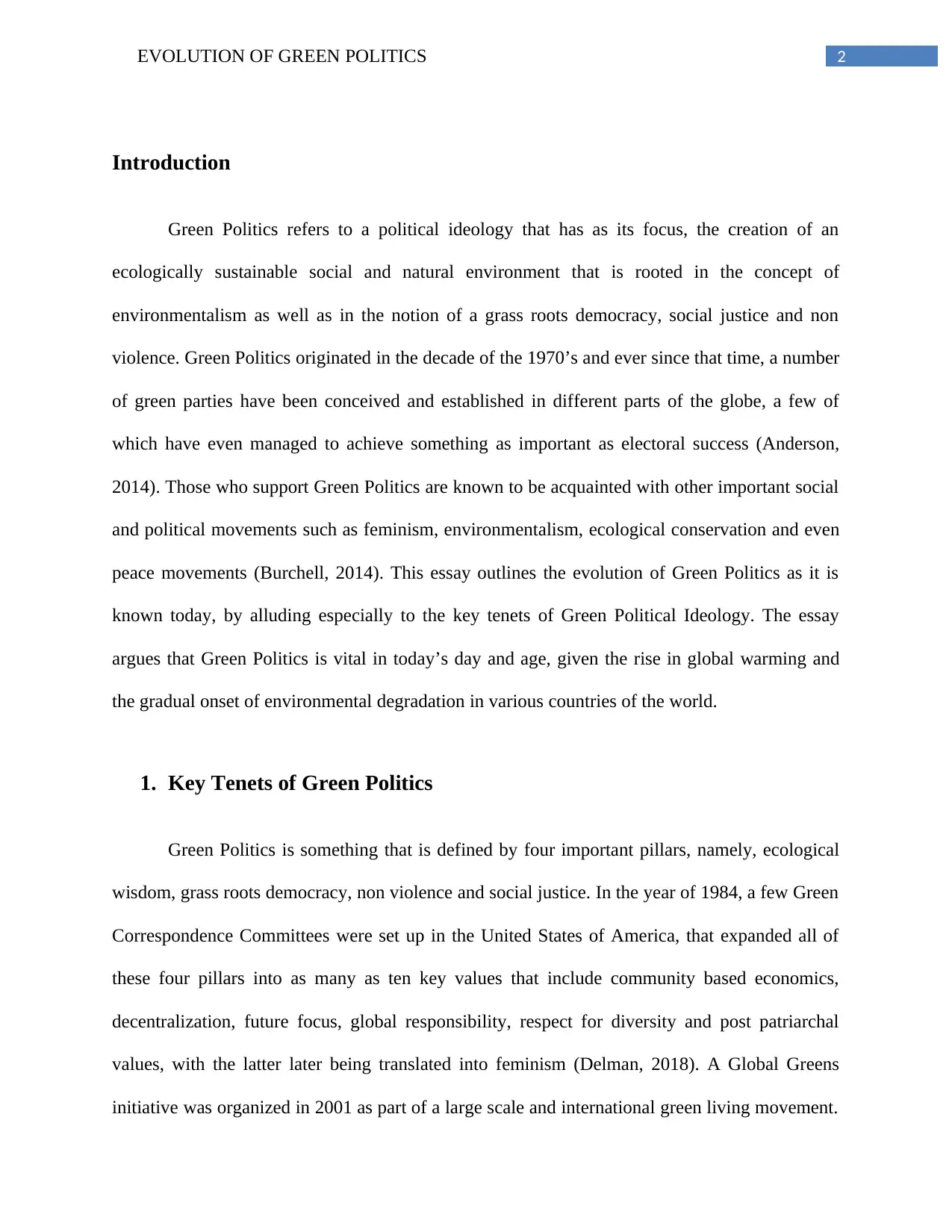
2EVOLUTION OF GREEN POLITICS
Introduction
Green Politics refers to a political ideology that has as its focus, the creation of an
ecologically sustainable social and natural environment that is rooted in the concept of
environmentalism as well as in the notion of a grass roots democracy, social justice and non
violence. Green Politics originated in the decade of the 1970’s and ever since that time, a number
of green parties have been conceived and established in different parts of the globe, a few of
which have even managed to achieve something as important as electoral success (Anderson,
2014). Those who support Green Politics are known to be acquainted with other important social
and political movements such as feminism, environmentalism, ecological conservation and even
peace movements (Burchell, 2014). This essay outlines the evolution of Green Politics as it is
known today, by alluding especially to the key tenets of Green Political Ideology. The essay
argues that Green Politics is vital in today’s day and age, given the rise in global warming and
the gradual onset of environmental degradation in various countries of the world.
1. Key Tenets of Green Politics
Green Politics is something that is defined by four important pillars, namely, ecological
wisdom, grass roots democracy, non violence and social justice. In the year of 1984, a few Green
Correspondence Committees were set up in the United States of America, that expanded all of
these four pillars into as many as ten key values that include community based economics,
decentralization, future focus, global responsibility, respect for diversity and post patriarchal
values, with the latter later being translated into feminism (Delman, 2018). A Global Greens
initiative was organized in 2001 as part of a large scale and international green living movement.
Introduction
Green Politics refers to a political ideology that has as its focus, the creation of an
ecologically sustainable social and natural environment that is rooted in the concept of
environmentalism as well as in the notion of a grass roots democracy, social justice and non
violence. Green Politics originated in the decade of the 1970’s and ever since that time, a number
of green parties have been conceived and established in different parts of the globe, a few of
which have even managed to achieve something as important as electoral success (Anderson,
2014). Those who support Green Politics are known to be acquainted with other important social
and political movements such as feminism, environmentalism, ecological conservation and even
peace movements (Burchell, 2014). This essay outlines the evolution of Green Politics as it is
known today, by alluding especially to the key tenets of Green Political Ideology. The essay
argues that Green Politics is vital in today’s day and age, given the rise in global warming and
the gradual onset of environmental degradation in various countries of the world.
1. Key Tenets of Green Politics
Green Politics is something that is defined by four important pillars, namely, ecological
wisdom, grass roots democracy, non violence and social justice. In the year of 1984, a few Green
Correspondence Committees were set up in the United States of America, that expanded all of
these four pillars into as many as ten key values that include community based economics,
decentralization, future focus, global responsibility, respect for diversity and post patriarchal
values, with the latter later being translated into feminism (Delman, 2018). A Global Greens
initiative was organized in 2001 as part of a large scale and international green living movement.
⊘ This is a preview!⊘
Do you want full access?
Subscribe today to unlock all pages.

Trusted by 1+ million students worldwide
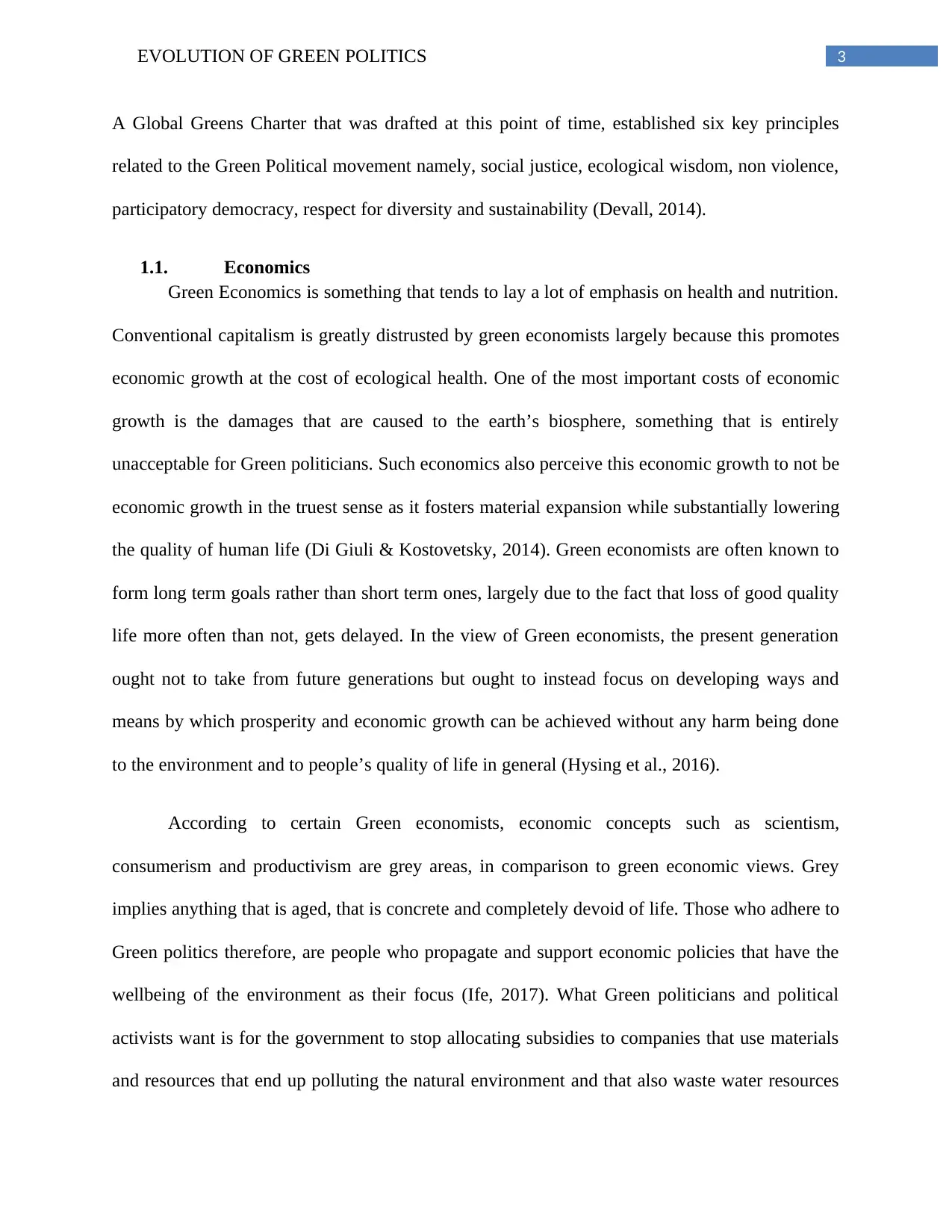
3EVOLUTION OF GREEN POLITICS
A Global Greens Charter that was drafted at this point of time, established six key principles
related to the Green Political movement namely, social justice, ecological wisdom, non violence,
participatory democracy, respect for diversity and sustainability (Devall, 2014).
1.1. Economics
Green Economics is something that tends to lay a lot of emphasis on health and nutrition.
Conventional capitalism is greatly distrusted by green economists largely because this promotes
economic growth at the cost of ecological health. One of the most important costs of economic
growth is the damages that are caused to the earth’s biosphere, something that is entirely
unacceptable for Green politicians. Such economics also perceive this economic growth to not be
economic growth in the truest sense as it fosters material expansion while substantially lowering
the quality of human life (Di Giuli & Kostovetsky, 2014). Green economists are often known to
form long term goals rather than short term ones, largely due to the fact that loss of good quality
life more often than not, gets delayed. In the view of Green economists, the present generation
ought not to take from future generations but ought to instead focus on developing ways and
means by which prosperity and economic growth can be achieved without any harm being done
to the environment and to people’s quality of life in general (Hysing et al., 2016).
According to certain Green economists, economic concepts such as scientism,
consumerism and productivism are grey areas, in comparison to green economic views. Grey
implies anything that is aged, that is concrete and completely devoid of life. Those who adhere to
Green politics therefore, are people who propagate and support economic policies that have the
wellbeing of the environment as their focus (Ife, 2017). What Green politicians and political
activists want is for the government to stop allocating subsidies to companies that use materials
and resources that end up polluting the natural environment and that also waste water resources
A Global Greens Charter that was drafted at this point of time, established six key principles
related to the Green Political movement namely, social justice, ecological wisdom, non violence,
participatory democracy, respect for diversity and sustainability (Devall, 2014).
1.1. Economics
Green Economics is something that tends to lay a lot of emphasis on health and nutrition.
Conventional capitalism is greatly distrusted by green economists largely because this promotes
economic growth at the cost of ecological health. One of the most important costs of economic
growth is the damages that are caused to the earth’s biosphere, something that is entirely
unacceptable for Green politicians. Such economics also perceive this economic growth to not be
economic growth in the truest sense as it fosters material expansion while substantially lowering
the quality of human life (Di Giuli & Kostovetsky, 2014). Green economists are often known to
form long term goals rather than short term ones, largely due to the fact that loss of good quality
life more often than not, gets delayed. In the view of Green economists, the present generation
ought not to take from future generations but ought to instead focus on developing ways and
means by which prosperity and economic growth can be achieved without any harm being done
to the environment and to people’s quality of life in general (Hysing et al., 2016).
According to certain Green economists, economic concepts such as scientism,
consumerism and productivism are grey areas, in comparison to green economic views. Grey
implies anything that is aged, that is concrete and completely devoid of life. Those who adhere to
Green politics therefore, are people who propagate and support economic policies that have the
wellbeing of the environment as their focus (Ife, 2017). What Green politicians and political
activists want is for the government to stop allocating subsidies to companies that use materials
and resources that end up polluting the natural environment and that also waste water resources
Paraphrase This Document
Need a fresh take? Get an instant paraphrase of this document with our AI Paraphraser
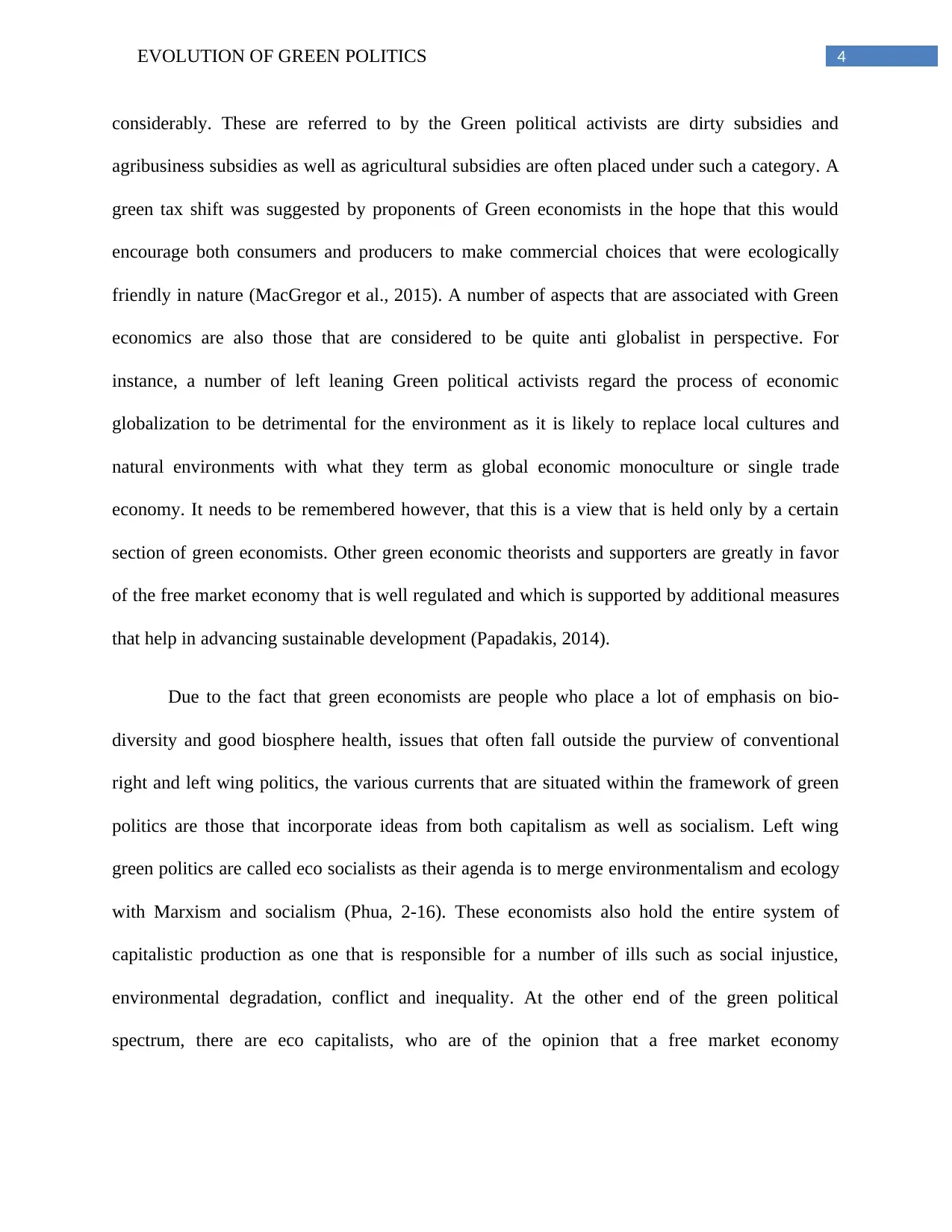
4EVOLUTION OF GREEN POLITICS
considerably. These are referred to by the Green political activists are dirty subsidies and
agribusiness subsidies as well as agricultural subsidies are often placed under such a category. A
green tax shift was suggested by proponents of Green economists in the hope that this would
encourage both consumers and producers to make commercial choices that were ecologically
friendly in nature (MacGregor et al., 2015). A number of aspects that are associated with Green
economics are also those that are considered to be quite anti globalist in perspective. For
instance, a number of left leaning Green political activists regard the process of economic
globalization to be detrimental for the environment as it is likely to replace local cultures and
natural environments with what they term as global economic monoculture or single trade
economy. It needs to be remembered however, that this is a view that is held only by a certain
section of green economists. Other green economic theorists and supporters are greatly in favor
of the free market economy that is well regulated and which is supported by additional measures
that help in advancing sustainable development (Papadakis, 2014).
Due to the fact that green economists are people who place a lot of emphasis on bio-
diversity and good biosphere health, issues that often fall outside the purview of conventional
right and left wing politics, the various currents that are situated within the framework of green
politics are those that incorporate ideas from both capitalism as well as socialism. Left wing
green politics are called eco socialists as their agenda is to merge environmentalism and ecology
with Marxism and socialism (Phua, 2-16). These economists also hold the entire system of
capitalistic production as one that is responsible for a number of ills such as social injustice,
environmental degradation, conflict and inequality. At the other end of the green political
spectrum, there are eco capitalists, who are of the opinion that a free market economy
considerably. These are referred to by the Green political activists are dirty subsidies and
agribusiness subsidies as well as agricultural subsidies are often placed under such a category. A
green tax shift was suggested by proponents of Green economists in the hope that this would
encourage both consumers and producers to make commercial choices that were ecologically
friendly in nature (MacGregor et al., 2015). A number of aspects that are associated with Green
economics are also those that are considered to be quite anti globalist in perspective. For
instance, a number of left leaning Green political activists regard the process of economic
globalization to be detrimental for the environment as it is likely to replace local cultures and
natural environments with what they term as global economic monoculture or single trade
economy. It needs to be remembered however, that this is a view that is held only by a certain
section of green economists. Other green economic theorists and supporters are greatly in favor
of the free market economy that is well regulated and which is supported by additional measures
that help in advancing sustainable development (Papadakis, 2014).
Due to the fact that green economists are people who place a lot of emphasis on bio-
diversity and good biosphere health, issues that often fall outside the purview of conventional
right and left wing politics, the various currents that are situated within the framework of green
politics are those that incorporate ideas from both capitalism as well as socialism. Left wing
green politics are called eco socialists as their agenda is to merge environmentalism and ecology
with Marxism and socialism (Phua, 2-16). These economists also hold the entire system of
capitalistic production as one that is responsible for a number of ills such as social injustice,
environmental degradation, conflict and inequality. At the other end of the green political
spectrum, there are eco capitalists, who are of the opinion that a free market economy
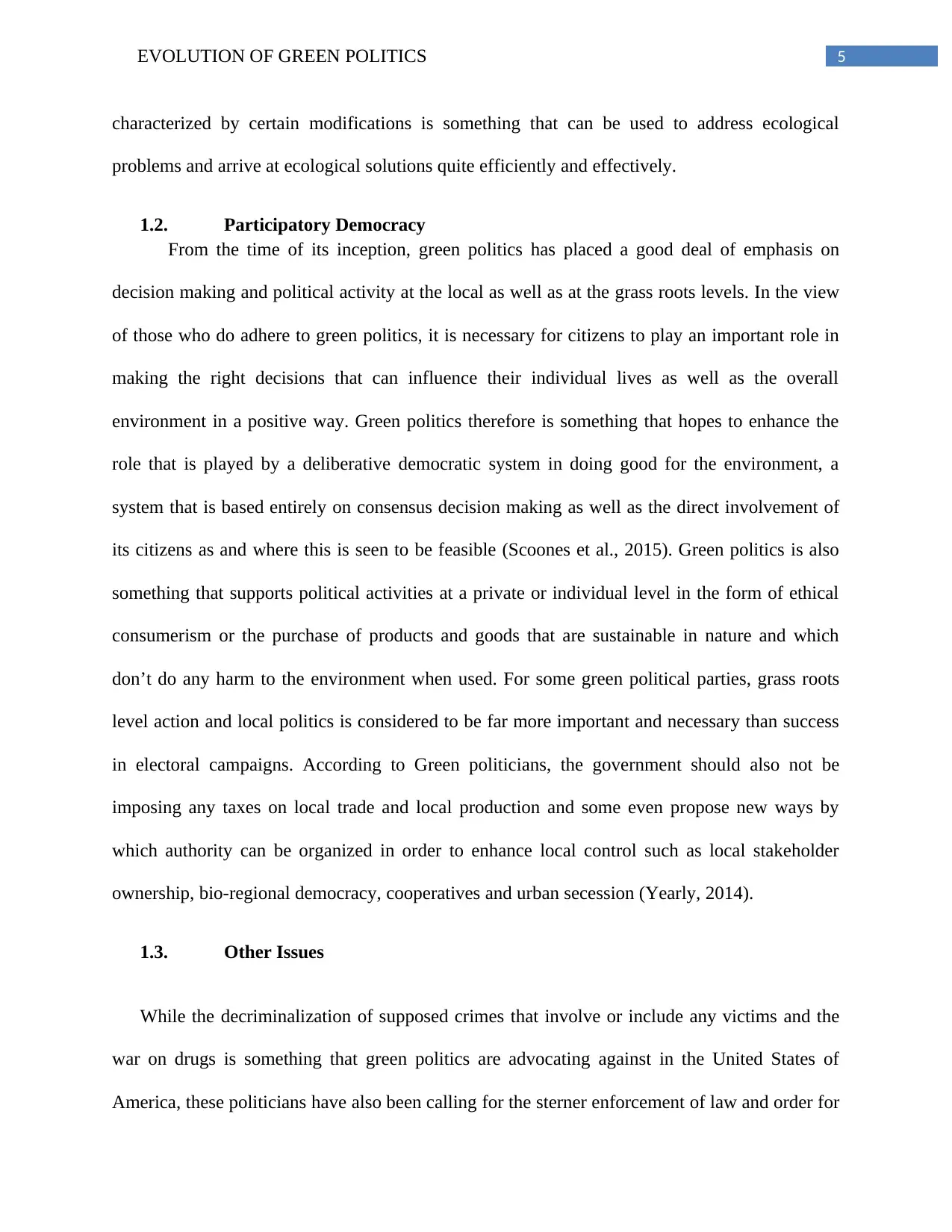
5EVOLUTION OF GREEN POLITICS
characterized by certain modifications is something that can be used to address ecological
problems and arrive at ecological solutions quite efficiently and effectively.
1.2. Participatory Democracy
From the time of its inception, green politics has placed a good deal of emphasis on
decision making and political activity at the local as well as at the grass roots levels. In the view
of those who do adhere to green politics, it is necessary for citizens to play an important role in
making the right decisions that can influence their individual lives as well as the overall
environment in a positive way. Green politics therefore is something that hopes to enhance the
role that is played by a deliberative democratic system in doing good for the environment, a
system that is based entirely on consensus decision making as well as the direct involvement of
its citizens as and where this is seen to be feasible (Scoones et al., 2015). Green politics is also
something that supports political activities at a private or individual level in the form of ethical
consumerism or the purchase of products and goods that are sustainable in nature and which
don’t do any harm to the environment when used. For some green political parties, grass roots
level action and local politics is considered to be far more important and necessary than success
in electoral campaigns. According to Green politicians, the government should also not be
imposing any taxes on local trade and local production and some even propose new ways by
which authority can be organized in order to enhance local control such as local stakeholder
ownership, bio-regional democracy, cooperatives and urban secession (Yearly, 2014).
1.3. Other Issues
While the decriminalization of supposed crimes that involve or include any victims and the
war on drugs is something that green politics are advocating against in the United States of
America, these politicians have also been calling for the sterner enforcement of law and order for
characterized by certain modifications is something that can be used to address ecological
problems and arrive at ecological solutions quite efficiently and effectively.
1.2. Participatory Democracy
From the time of its inception, green politics has placed a good deal of emphasis on
decision making and political activity at the local as well as at the grass roots levels. In the view
of those who do adhere to green politics, it is necessary for citizens to play an important role in
making the right decisions that can influence their individual lives as well as the overall
environment in a positive way. Green politics therefore is something that hopes to enhance the
role that is played by a deliberative democratic system in doing good for the environment, a
system that is based entirely on consensus decision making as well as the direct involvement of
its citizens as and where this is seen to be feasible (Scoones et al., 2015). Green politics is also
something that supports political activities at a private or individual level in the form of ethical
consumerism or the purchase of products and goods that are sustainable in nature and which
don’t do any harm to the environment when used. For some green political parties, grass roots
level action and local politics is considered to be far more important and necessary than success
in electoral campaigns. According to Green politicians, the government should also not be
imposing any taxes on local trade and local production and some even propose new ways by
which authority can be organized in order to enhance local control such as local stakeholder
ownership, bio-regional democracy, cooperatives and urban secession (Yearly, 2014).
1.3. Other Issues
While the decriminalization of supposed crimes that involve or include any victims and the
war on drugs is something that green politics are advocating against in the United States of
America, these politicians have also been calling for the sterner enforcement of law and order for
⊘ This is a preview!⊘
Do you want full access?
Subscribe today to unlock all pages.

Trusted by 1+ million students worldwide
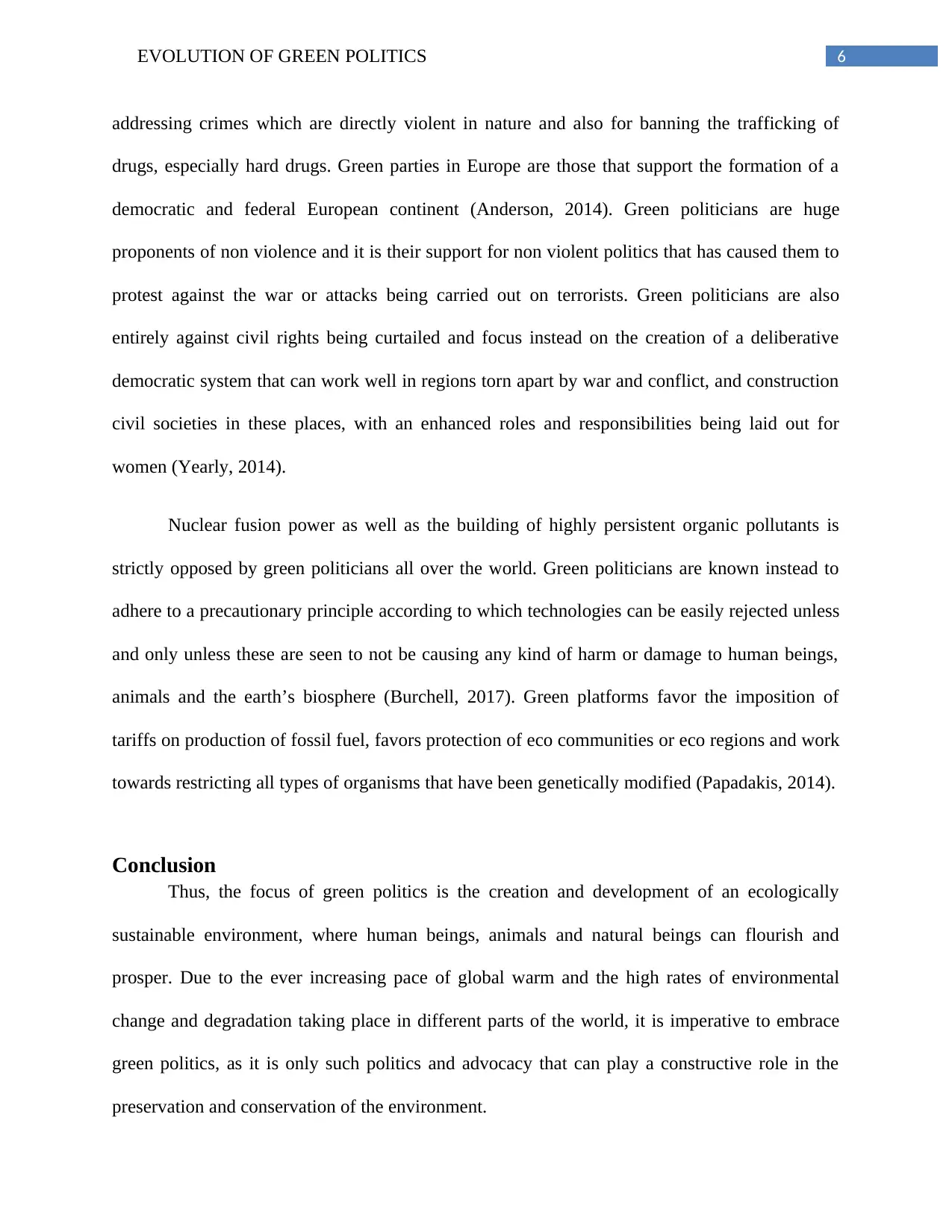
6EVOLUTION OF GREEN POLITICS
addressing crimes which are directly violent in nature and also for banning the trafficking of
drugs, especially hard drugs. Green parties in Europe are those that support the formation of a
democratic and federal European continent (Anderson, 2014). Green politicians are huge
proponents of non violence and it is their support for non violent politics that has caused them to
protest against the war or attacks being carried out on terrorists. Green politicians are also
entirely against civil rights being curtailed and focus instead on the creation of a deliberative
democratic system that can work well in regions torn apart by war and conflict, and construction
civil societies in these places, with an enhanced roles and responsibilities being laid out for
women (Yearly, 2014).
Nuclear fusion power as well as the building of highly persistent organic pollutants is
strictly opposed by green politicians all over the world. Green politicians are known instead to
adhere to a precautionary principle according to which technologies can be easily rejected unless
and only unless these are seen to not be causing any kind of harm or damage to human beings,
animals and the earth’s biosphere (Burchell, 2017). Green platforms favor the imposition of
tariffs on production of fossil fuel, favors protection of eco communities or eco regions and work
towards restricting all types of organisms that have been genetically modified (Papadakis, 2014).
Conclusion
Thus, the focus of green politics is the creation and development of an ecologically
sustainable environment, where human beings, animals and natural beings can flourish and
prosper. Due to the ever increasing pace of global warm and the high rates of environmental
change and degradation taking place in different parts of the world, it is imperative to embrace
green politics, as it is only such politics and advocacy that can play a constructive role in the
preservation and conservation of the environment.
addressing crimes which are directly violent in nature and also for banning the trafficking of
drugs, especially hard drugs. Green parties in Europe are those that support the formation of a
democratic and federal European continent (Anderson, 2014). Green politicians are huge
proponents of non violence and it is their support for non violent politics that has caused them to
protest against the war or attacks being carried out on terrorists. Green politicians are also
entirely against civil rights being curtailed and focus instead on the creation of a deliberative
democratic system that can work well in regions torn apart by war and conflict, and construction
civil societies in these places, with an enhanced roles and responsibilities being laid out for
women (Yearly, 2014).
Nuclear fusion power as well as the building of highly persistent organic pollutants is
strictly opposed by green politicians all over the world. Green politicians are known instead to
adhere to a precautionary principle according to which technologies can be easily rejected unless
and only unless these are seen to not be causing any kind of harm or damage to human beings,
animals and the earth’s biosphere (Burchell, 2017). Green platforms favor the imposition of
tariffs on production of fossil fuel, favors protection of eco communities or eco regions and work
towards restricting all types of organisms that have been genetically modified (Papadakis, 2014).
Conclusion
Thus, the focus of green politics is the creation and development of an ecologically
sustainable environment, where human beings, animals and natural beings can flourish and
prosper. Due to the ever increasing pace of global warm and the high rates of environmental
change and degradation taking place in different parts of the world, it is imperative to embrace
green politics, as it is only such politics and advocacy that can play a constructive role in the
preservation and conservation of the environment.
Paraphrase This Document
Need a fresh take? Get an instant paraphrase of this document with our AI Paraphraser
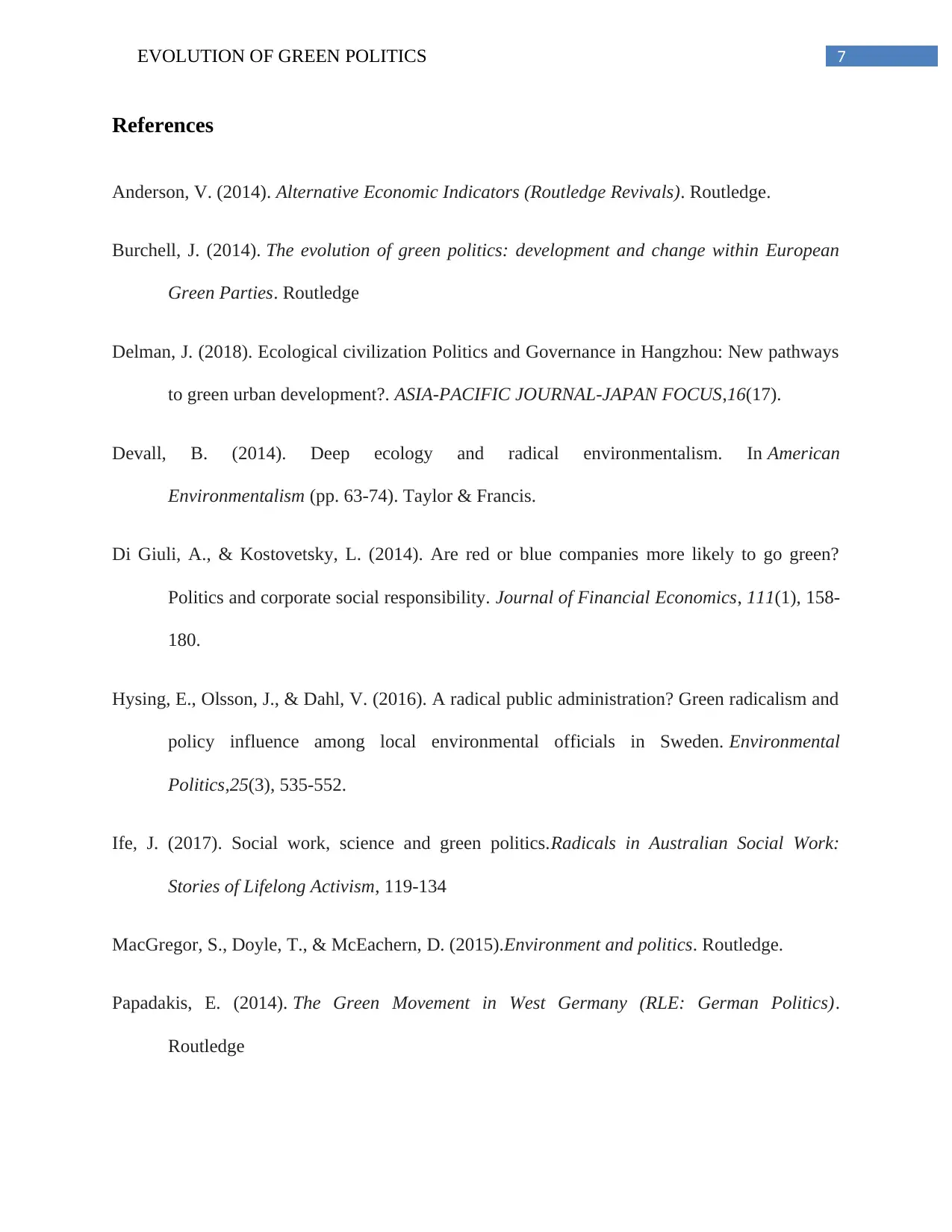
7EVOLUTION OF GREEN POLITICS
References
Anderson, V. (2014). Alternative Economic Indicators (Routledge Revivals). Routledge.
Burchell, J. (2014). The evolution of green politics: development and change within European
Green Parties. Routledge
Delman, J. (2018). Ecological civilization Politics and Governance in Hangzhou: New pathways
to green urban development?. ASIA-PACIFIC JOURNAL-JAPAN FOCUS,16(17).
Devall, B. (2014). Deep ecology and radical environmentalism. In American
Environmentalism (pp. 63-74). Taylor & Francis.
Di Giuli, A., & Kostovetsky, L. (2014). Are red or blue companies more likely to go green?
Politics and corporate social responsibility. Journal of Financial Economics, 111(1), 158-
180.
Hysing, E., Olsson, J., & Dahl, V. (2016). A radical public administration? Green radicalism and
policy influence among local environmental officials in Sweden. Environmental
Politics,25(3), 535-552.
Ife, J. (2017). Social work, science and green politics.Radicals in Australian Social Work:
Stories of Lifelong Activism, 119-134
MacGregor, S., Doyle, T., & McEachern, D. (2015).Environment and politics. Routledge.
Papadakis, E. (2014). The Green Movement in West Germany (RLE: German Politics).
Routledge
References
Anderson, V. (2014). Alternative Economic Indicators (Routledge Revivals). Routledge.
Burchell, J. (2014). The evolution of green politics: development and change within European
Green Parties. Routledge
Delman, J. (2018). Ecological civilization Politics and Governance in Hangzhou: New pathways
to green urban development?. ASIA-PACIFIC JOURNAL-JAPAN FOCUS,16(17).
Devall, B. (2014). Deep ecology and radical environmentalism. In American
Environmentalism (pp. 63-74). Taylor & Francis.
Di Giuli, A., & Kostovetsky, L. (2014). Are red or blue companies more likely to go green?
Politics and corporate social responsibility. Journal of Financial Economics, 111(1), 158-
180.
Hysing, E., Olsson, J., & Dahl, V. (2016). A radical public administration? Green radicalism and
policy influence among local environmental officials in Sweden. Environmental
Politics,25(3), 535-552.
Ife, J. (2017). Social work, science and green politics.Radicals in Australian Social Work:
Stories of Lifelong Activism, 119-134
MacGregor, S., Doyle, T., & McEachern, D. (2015).Environment and politics. Routledge.
Papadakis, E. (2014). The Green Movement in West Germany (RLE: German Politics).
Routledge
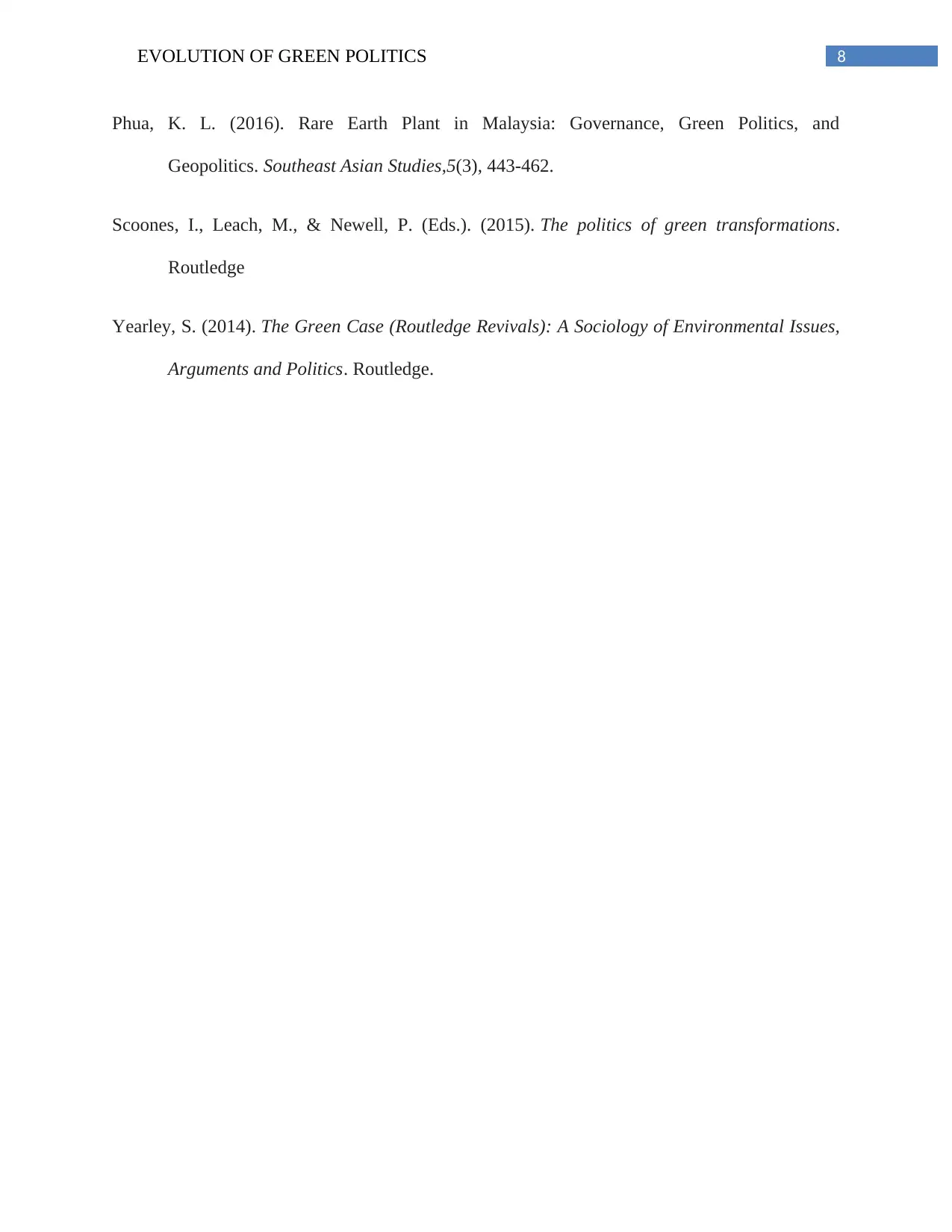
8EVOLUTION OF GREEN POLITICS
Phua, K. L. (2016). Rare Earth Plant in Malaysia: Governance, Green Politics, and
Geopolitics. Southeast Asian Studies,5(3), 443-462.
Scoones, I., Leach, M., & Newell, P. (Eds.). (2015). The politics of green transformations.
Routledge
Yearley, S. (2014). The Green Case (Routledge Revivals): A Sociology of Environmental Issues,
Arguments and Politics. Routledge.
Phua, K. L. (2016). Rare Earth Plant in Malaysia: Governance, Green Politics, and
Geopolitics. Southeast Asian Studies,5(3), 443-462.
Scoones, I., Leach, M., & Newell, P. (Eds.). (2015). The politics of green transformations.
Routledge
Yearley, S. (2014). The Green Case (Routledge Revivals): A Sociology of Environmental Issues,
Arguments and Politics. Routledge.
⊘ This is a preview!⊘
Do you want full access?
Subscribe today to unlock all pages.

Trusted by 1+ million students worldwide
1 out of 9
Your All-in-One AI-Powered Toolkit for Academic Success.
+13062052269
info@desklib.com
Available 24*7 on WhatsApp / Email
![[object Object]](/_next/static/media/star-bottom.7253800d.svg)
Unlock your academic potential
Copyright © 2020–2026 A2Z Services. All Rights Reserved. Developed and managed by ZUCOL.